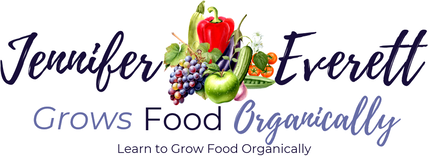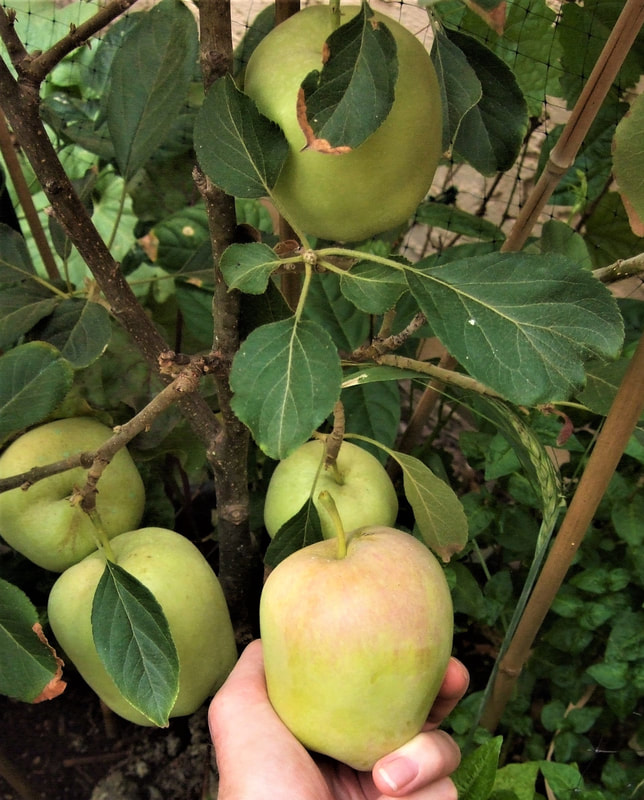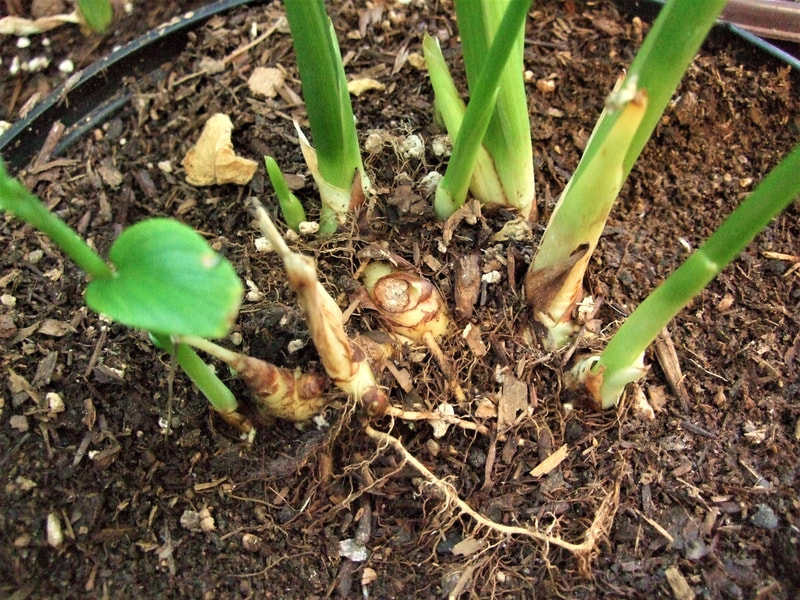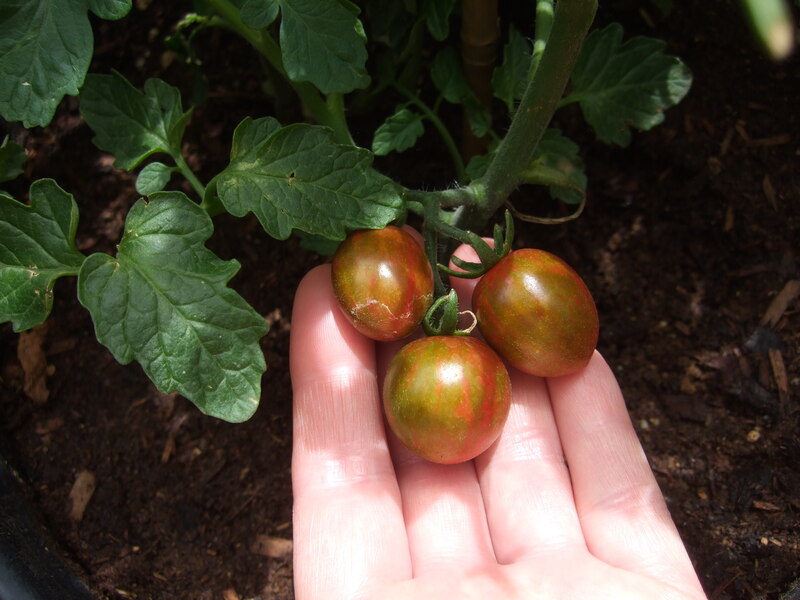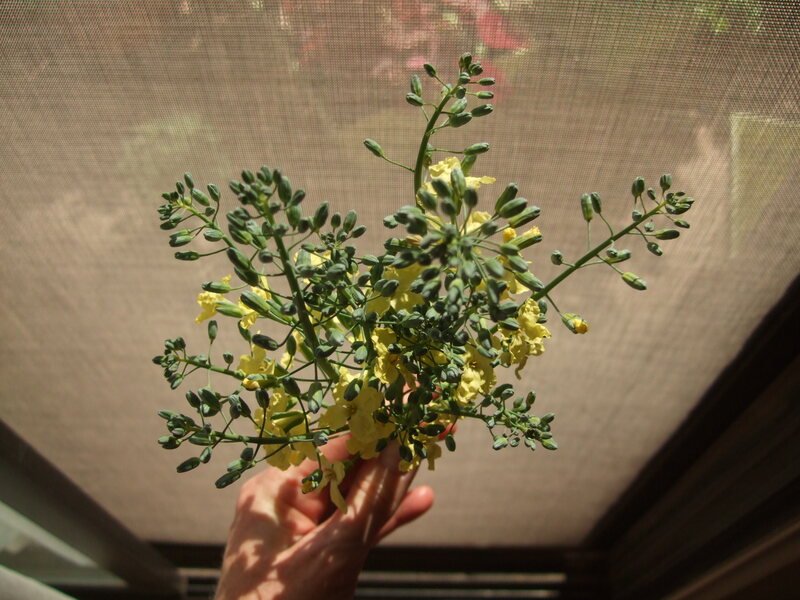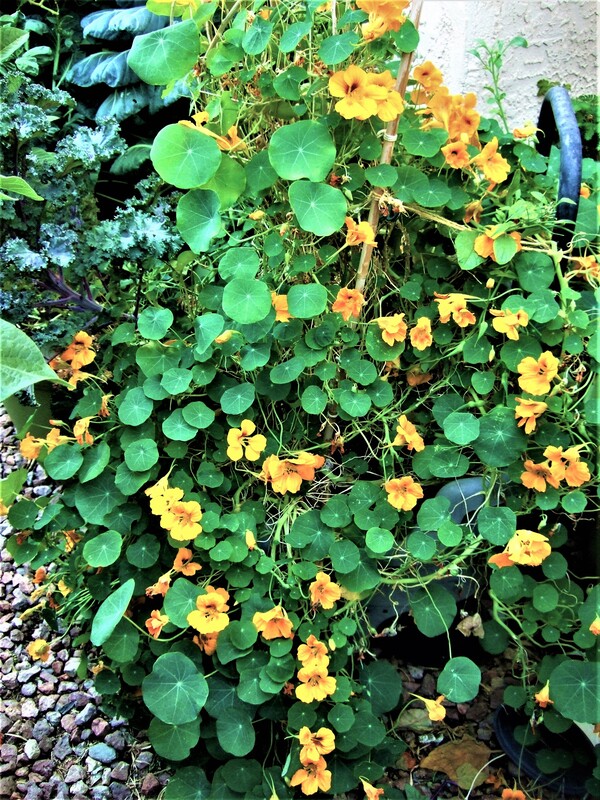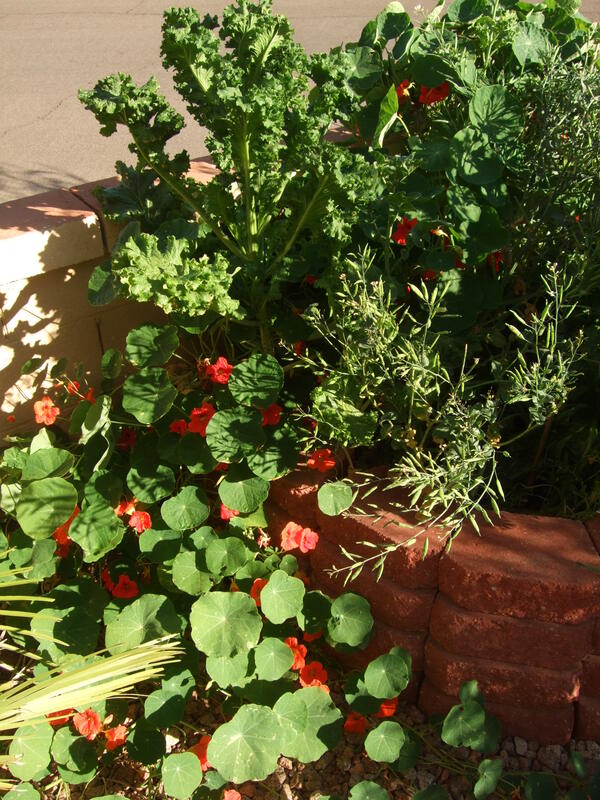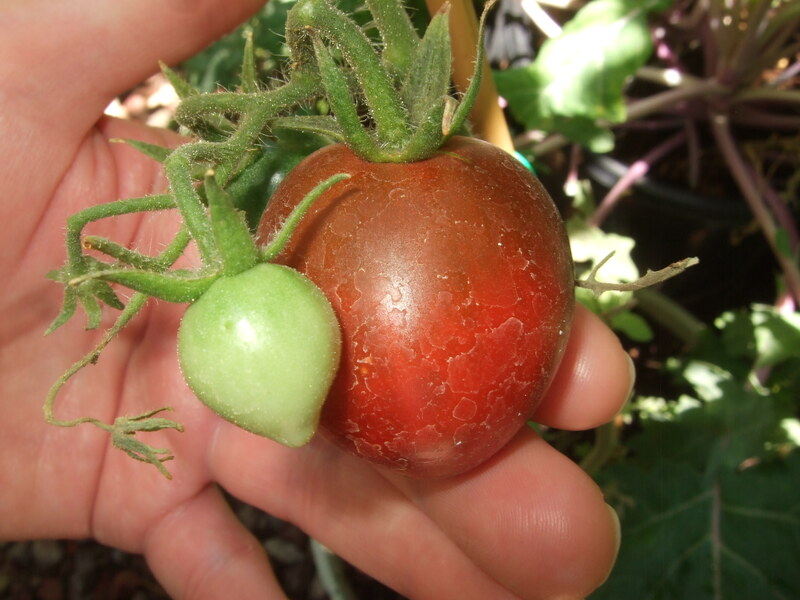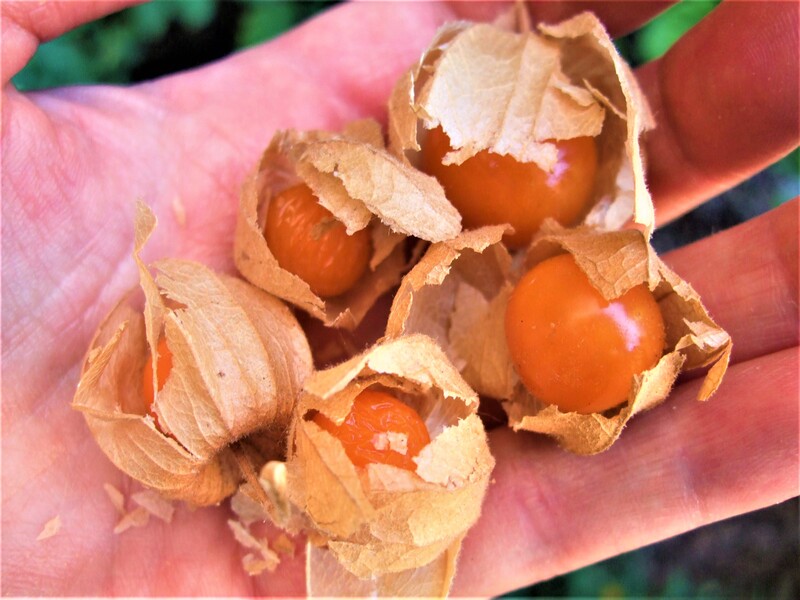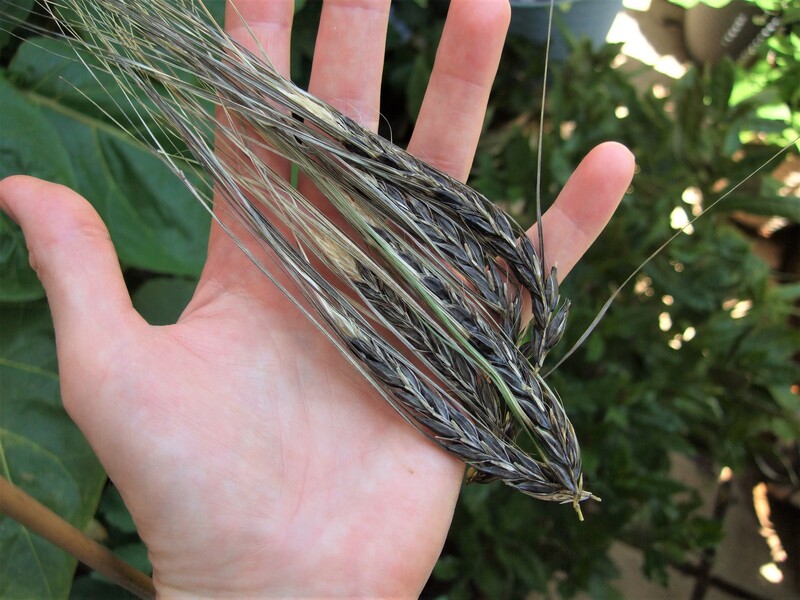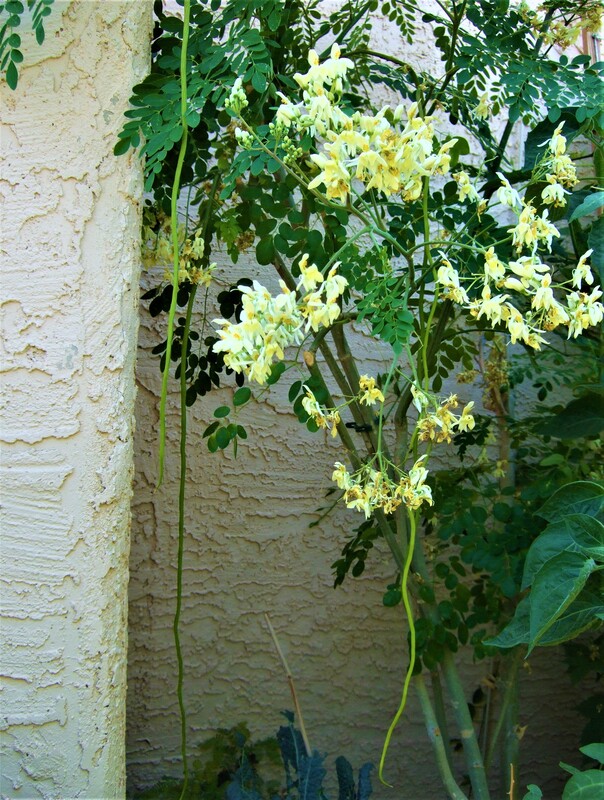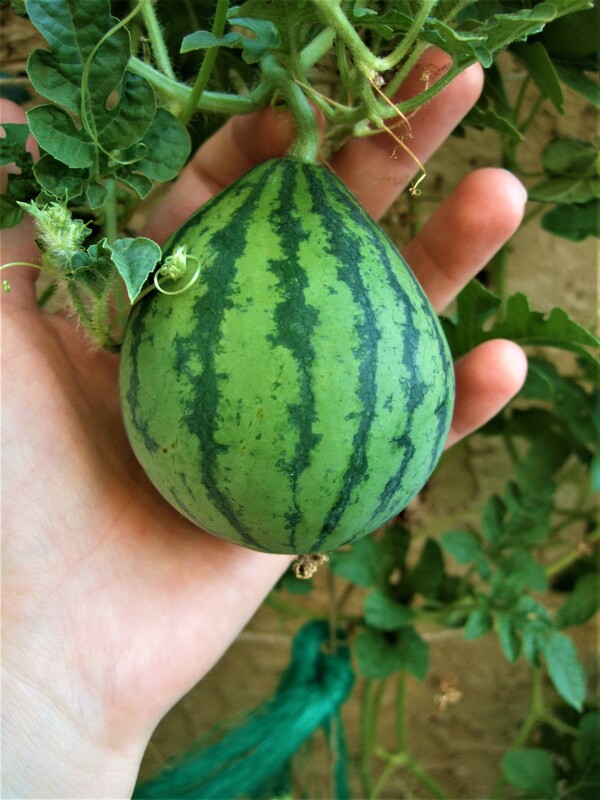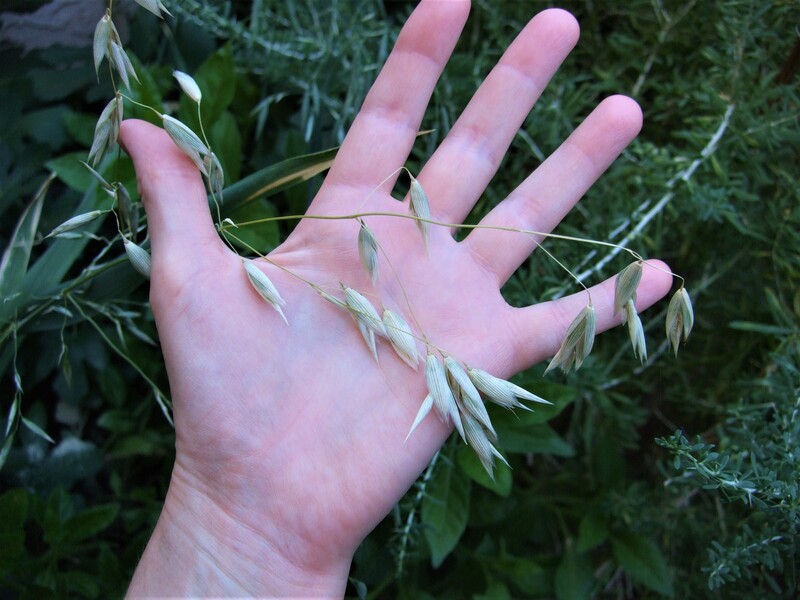AND WHY GROW MY OWN FOOD
Ornamentals clearly benefit the planet (producing oxygen, consuming CO2, reducing pathogens and pollution, creating the coolness of shade, providing a habitat that nurtures our diverse ecosystem, and feeding the bees that help to feed us are a few reasons that come to mind), but if you ask me, food is too infrequently planted in our yards.
Edible plants provide many of the benefits of ornamentals and tend to be ornamental themselves; plus, of course, they provide food. They can also nourish us better than what’s available from stores if fertilized sufficiently and consumed quickly. (Vitamin C levels, for example, tend to drop quickly after harvest—in some foods more quickly than others.) Beyond nutrition and food production, it is vital that we be good stewards of the planet and our resources including water consumption; dual-purpose plants help us accomplish those goals. This combination of attributes is what I believe makes edible landscaping a far superior use of resources!
But there are additional reasons that motivate me to grow my own food and help others grow their own food. One is that pollen from GMO fields can be carried by wind and insects to non-GMO fields, making it harder for organic farmers to obtain organic certification for crops started with last year’s seed and making it so that a much larger percentage of God’s edible creation could someday become contaminated with laboratory created, GMO genes. Plants that contain fruit fly or other non-plant genes are something that would never be found in nature as the two cannot mate. Someday many more commercially available foods and even seeds may be GMO. If I haven’t already obtained pure seed and begun growing my own food, then what? Not only that, but some are observing that GMO foods have less nutrition and seem to be incapable of reaching sufficient levels.
We live in an imperfect world, and there will always be some variables that are flat out beyond my control (e.g., smokers transferring third-hand smoke to my garden), but risk reduction is always wise if you ask me.
With my own organic edible garden, I can take control of a number of the variables that affect the quality of my food. I know what I put into the soil or onto the foliage, what I didn’t (the bad stuff like unnecessarily strong/toxic pesticides), and I can consume my food within minutes of harvest--in some cases, for far higher nutrient density--instead of days, weeks, or months after harvest. My food is often prettier (e.g., okra that has not browned) and tastier or more tender partly due to the cultivar (e.g., eggplants that aren’t bitter or tomatoes with the amount of sweetness and acidity that I prefer). I can grow food that is not easily found in stores, I can harvest small amounts at a time (e.g., for a parakeet), and it won’t be touched by numbers of hands by the time I bring it home. But while I do grow mostly in plastic containers (some types of plastic are better than others), I can choose a better hose (even storing it indoors when not in use) and minimize the transfer of its plastic chemicals (and metals from some hoses) to my garden. For those with a bigger budget, it would also be possible to filter out some of the undesirable components of tap water.
But there are additional reasons for growing organically. A big one for me is that it reduces dependence on laboratories as it uses the simple system that God put in place for feeding ourselves. Another is that organic gardening involves a slow breakdown of organic materials by microbes and more to supply the plant what it needs in small bites while minimizing run-off that is common with water-soluble fertilizers. It’s not only loss of nutrients through run-off that concerns me but that the dead zones in our oceans and temporary red coloration in other bodies of water are caused by the deadly algae that proliferates to a large degree in response to excess nitrogen, phosphorus, and chemical waste ending up there from commercial agriculture and other industries. God’s systems may be slower in some ways, but they work for us, for plants, and for the planet.
Edible plants provide many of the benefits of ornamentals and tend to be ornamental themselves; plus, of course, they provide food. They can also nourish us better than what’s available from stores if fertilized sufficiently and consumed quickly. (Vitamin C levels, for example, tend to drop quickly after harvest—in some foods more quickly than others.) Beyond nutrition and food production, it is vital that we be good stewards of the planet and our resources including water consumption; dual-purpose plants help us accomplish those goals. This combination of attributes is what I believe makes edible landscaping a far superior use of resources!
But there are additional reasons that motivate me to grow my own food and help others grow their own food. One is that pollen from GMO fields can be carried by wind and insects to non-GMO fields, making it harder for organic farmers to obtain organic certification for crops started with last year’s seed and making it so that a much larger percentage of God’s edible creation could someday become contaminated with laboratory created, GMO genes. Plants that contain fruit fly or other non-plant genes are something that would never be found in nature as the two cannot mate. Someday many more commercially available foods and even seeds may be GMO. If I haven’t already obtained pure seed and begun growing my own food, then what? Not only that, but some are observing that GMO foods have less nutrition and seem to be incapable of reaching sufficient levels.
We live in an imperfect world, and there will always be some variables that are flat out beyond my control (e.g., smokers transferring third-hand smoke to my garden), but risk reduction is always wise if you ask me.
With my own organic edible garden, I can take control of a number of the variables that affect the quality of my food. I know what I put into the soil or onto the foliage, what I didn’t (the bad stuff like unnecessarily strong/toxic pesticides), and I can consume my food within minutes of harvest--in some cases, for far higher nutrient density--instead of days, weeks, or months after harvest. My food is often prettier (e.g., okra that has not browned) and tastier or more tender partly due to the cultivar (e.g., eggplants that aren’t bitter or tomatoes with the amount of sweetness and acidity that I prefer). I can grow food that is not easily found in stores, I can harvest small amounts at a time (e.g., for a parakeet), and it won’t be touched by numbers of hands by the time I bring it home. But while I do grow mostly in plastic containers (some types of plastic are better than others), I can choose a better hose (even storing it indoors when not in use) and minimize the transfer of its plastic chemicals (and metals from some hoses) to my garden. For those with a bigger budget, it would also be possible to filter out some of the undesirable components of tap water.
But there are additional reasons for growing organically. A big one for me is that it reduces dependence on laboratories as it uses the simple system that God put in place for feeding ourselves. Another is that organic gardening involves a slow breakdown of organic materials by microbes and more to supply the plant what it needs in small bites while minimizing run-off that is common with water-soluble fertilizers. It’s not only loss of nutrients through run-off that concerns me but that the dead zones in our oceans and temporary red coloration in other bodies of water are caused by the deadly algae that proliferates to a large degree in response to excess nitrogen, phosphorus, and chemical waste ending up there from commercial agriculture and other industries. God’s systems may be slower in some ways, but they work for us, for plants, and for the planet.
PRICING
Pricing for my organic vegetable gardening consulting service is listed on this page.
